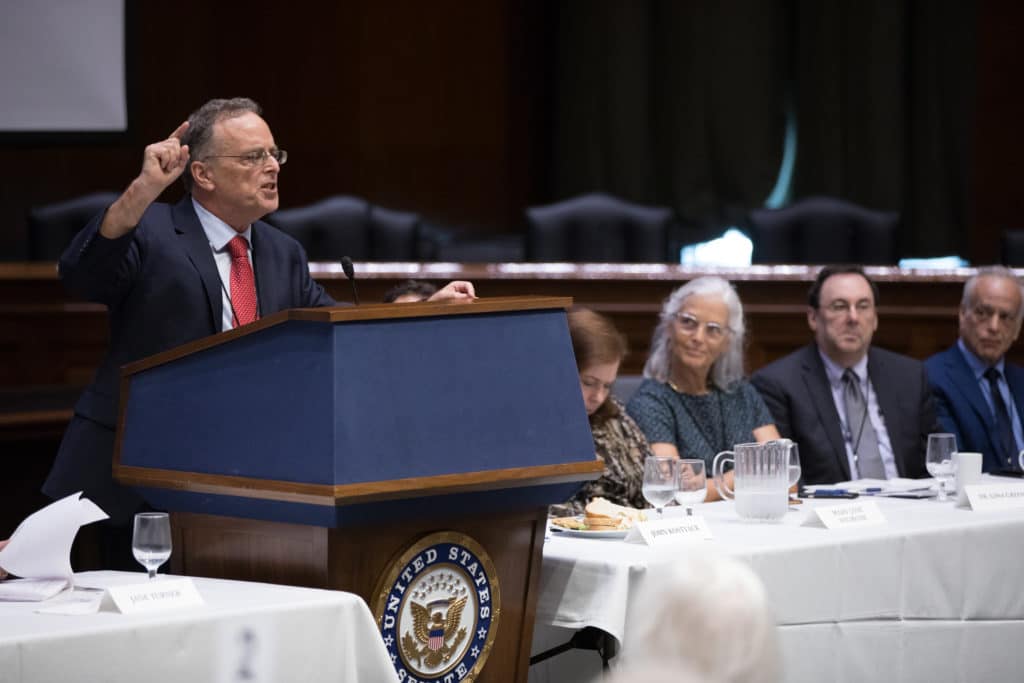The Ninth Annual Whistleblower Summit and Film Festival is currently underway. The Summit, which features panel discussions and over forty films, is in celebration of National Whistleblower Day, which is on July 30. On July 29, the Summit featured a panel titled The Story Behind National Whistleblower Day. In this presentation, Stephen M. Kohn, founding partner at the qui tam law firm Kohn, Kohn and Colapinto, explained the history of America’s first whistleblower law and why July 30 is designated as National Whistleblower Day. Panels from the Whistleblower Summit are available to stream until the end of the festival.
Jane Turner, a FBI whistleblower and whistleblower advocate, introduced Kohn. She recounted his years of whistleblower advocacy both through his legal practice and through the National Whistleblower Center, which he helped found. She expressed personal gratitude for Kohn’s tireless work in representing her and described him as a “the top expert in whistleblower protection law” and “a giant and a warrior in the whistleblower world.”
Kohn began by explaining that in writing his book, The New Whistleblower’s Handbook, he conducted original historical research to find the first whistleblower case in American history. Kohn continued by stating that the story of this first law starts in 1777, just sixth months after the signing of the Declaration of Independence. In February of that year, ten American sailors and marines met together to express their concerns that Commodore Esek Hopkins, the commander in chief of the Continental Navy, was corrupt. These ten individuals signed a petition accusing Hopkins of a number of corrupt and immoral acts, including the mistreatment of British prisoners. Notably, Hopkins came from a wealthy Rhode Island family and his brother was a signer of the Declaration of Independence. Kohn observed that the dynamic at play is “precisely what you see in many whistleblower cases: some working people, these sailors and marines, versus an extremely powerful individual with wealth and connections.”
Kohn continued the story and explained how one of the sailors abandoned ship and took the whistleblower petition to the Continental Congress in Philadelphia. “And now we have the first whistleblower case in American history,” stated Kohn. “What did our founding fathers think should happen? What did they understand the government they were creating, how they should treat whistleblowers?” In a pivotal move, the Continental Congress listened to the whistleblower’s testimony, reviewed the facts, and suspended, then later terminated, Hopkins.
But the story does not end there. Hopkins retaliated by suing two of the sailors for seditious libel and successfully had them imprisoned. “And now you roll out the second part of this history,” continued Kohn. “How does the U.S. government deal with the retaliation?’” The two imprisoned sailors, Marvin and Shaw, wrote a letter to the Continental Congress. “It was remarkable,” Kohn said of the letter. “The sentiments and the issues was exactly what I hear today [in representing whistleblowers].” In response, the Continental Congress unanimously agreed to three things. First they made public all the information of the case, including the claims of abuse of prisoners. Second, they assigned lawyers to represent Marvin and Shaw. And lastly, they passed the world’s first known whistleblower law, which stated that it is the duty of all inhabitants of the U.S. to report to Congress, or the proper authority, any fraud or misconduct committed by individuals in service of the country. This resolution was passed on July 30, 1778, which is why the date is designated as National Whistleblower Day.
Since Kohn first discovered this history in 2011, the U.S. Congress has designated July 30 as National Whistleblower Appreciation Day every year. But they have yet to permanently designate the holiday. Sign the petition to urge Congress to do so.
